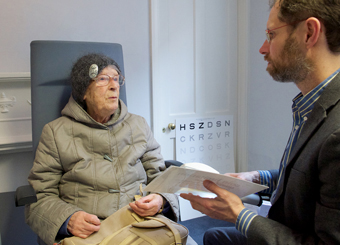
You may have heard of a term called Low Vision?
A small number of people have sight problems so that even with spectacles, treatment or surgery they are not able to easily see to be able to complete certain tasks or necessities. It’s also known as low vision. You might have problems such as reading small print or recognising faces.
Low vision has lots of different causes and can come upon you gradually. In the early stages you might not have any signs or symptoms. In this case, the only way to detect problems is by having an eye examination.
Nick Black, BBR’s chief executive, says: “We are highlighting Low Vision as part of National Eye Health Week (September 18-24) and recommend you have an eye examination every two years or more regularly if your optometrist recommends that.
“At BBR Optometry we like to spend the time with you to understand your individual circumstances and use appropriate technology to monitor and record your eye health.
“In Herefordshire we are also fortunate to have a community low vision service which allows a more detailed appointment to look into any area of concern to understand if there are functional considerations to help.
“There is no charge for this service and we have a range of appliances that may be loaned out to you. This may be the introduction of devices like magnifiers, telescopes or high powered spectacles. This is available as a self-referral service, but if you have had an examination elsewhere we would request a report of the findings to optimise the outcome for you,” he added.
We have a saying: BIG, BOLD and BRIGHT.
- Big – if you make things bigger or enlarge them generally you will see them better
- Bold – if you make things bolder, then you can generally make them out easier. Such as writing in a medium felt-tip rather than biro pen.
- Bright – if you increase the brightness with more light or different foreground vs background things will be easier. In lighting the distance to the light is key! If you halve the distance to the light you do not double, but quadruple the illumination.
Nick adds: “For many people living with reduced vision it is the day-to-day things that are most important, so we need to be able to work closely with other organisations and individuals to signpost people as needed.
“In the Midlands only two in 10 people do not know that there is support available when your vision changes. If you are one of these people then please contact us to discuss the possibility of a low vision assessment to explore what we can do to assist,” he added.
You can also receive support from Herefordshire Vision Links or the Macular Disease Society.
